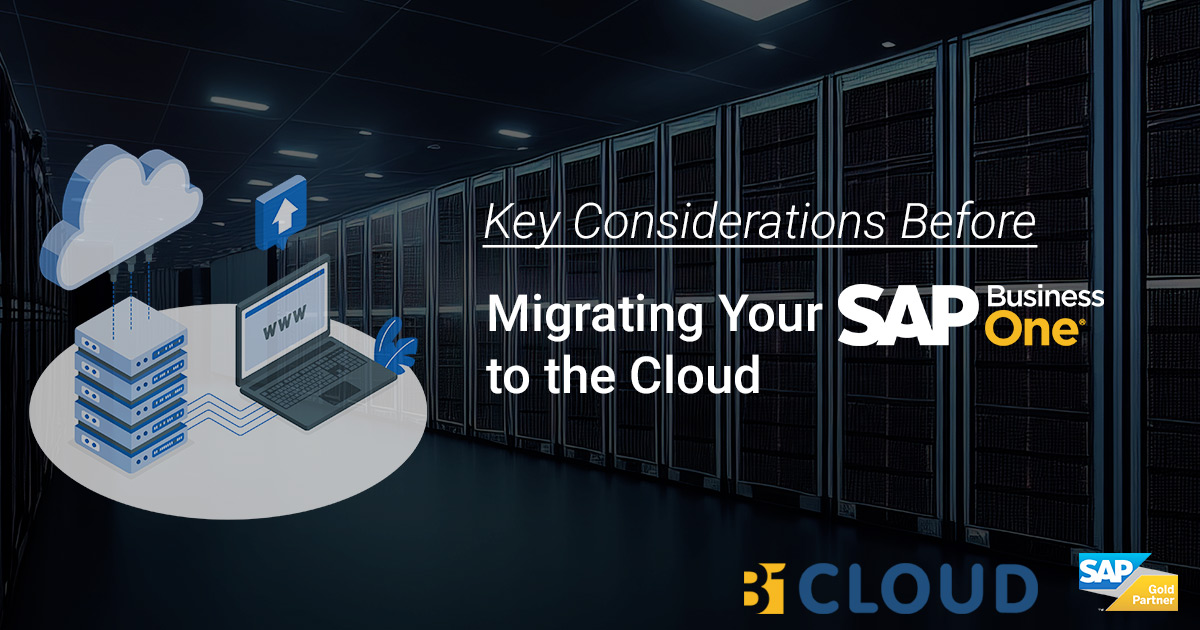Cloud Computing is now present in every aspect of our lives. With advancements in technology, it stores tons of data across servers and is accessible 24/7. It has emerged as a bridge for our need for access to anything, from anywhere and at all times. ERP solutions are no different. For years now, SAP Business One has been offering the cloud deployment option alongside the time-tested on-premises approach. And it has worked wonders for micro, small, and medium-sized businesses.
An on-premises approach can often lead to financial strains on the MSMEs. Cloud provides an excellent alternative to it, albeit at low costs. It’s one of the primary reasons why it is a preferred deployment option and one of the many reasons to move SAP Business One to the cloud.
Moving SAP Business One to the cloud is a transformative step that offers numerous benefits, but also requires careful planning and execution.
In this blog post, we’ll explore some key factors you need to consider before making this transition:
Implementation Time
SAP Business One ERP Implementation can be a long drawn-out process. Especially, since an average on-premises implementation can take anywhere from 90-180 days. SMEs often don’t have the luxury of spending that amount of time on a single task. Moving or deploying to the cloud on cloud hosting services such as B1Cloud, takes significantly less amount of time. Since there are no in-house IT infrastructure requirements, the implementation time is cut short with minimal disruption. Implementation time has to be a primary consideration when moving to the cloud.
Scalability & Flexibility
Cloud hosting offers a significant advantage in terms of Scalability and flexibility. It makes it an alluring prospect for small & and medium businesses or rapidly growing start-ups. The ability to effortlessly increase or decrease resources such as storage and bandwidth in response to your organization’s demands is a game-changer. SAP Business One offers unmatched scalability and flexibility when hosted on the cloud and should be one of the key considerations when you’re thinking of migrating to the cloud.
Cost of Ownership
The Cost of Ownership is an important factor when considering deploying SAP Business One on the cloud or when moving to one. Sure cloud-based SAP Business One solution incurs monthly fees for accessing cloud services and licenses. But at the same time, the already high prices of investing in expensive in-house infrastructure coupled with the need to continuously maintain, and recurrent updates to sustain competitiveness, tends to increase the total cost of ownership in the on-premises model. Compared to those expenses, most organizations find the cloud more viable in the long run.
Reliability
Reliability is another factor that needs to be considered when moving the SAP Business One ERP solution to the cloud. Cloud servers today are much more advanced, interconnected, and secure. They substantially mitigate downtime occurrences and seamlessly aid in disaster recovery in the event of a server failure. Plus the multi-server cloud architecture ensures excellent handling of the traffic on the solution at a single point in time, ensuring data integrity at all times and even in the face of individual server failures. The uptime of the solution is greatly enhanced and the reliability of the cloud is a key consideration one should keep in mind when deciding to move to it.
Collaboration
Post-pandemic, numerous enterprises have embraced remote or hybrid work setups. This has given rise to a scenario where a substantial portion of employees operate outside the traditional office environment. Cloud hosting facilitates universal access to applications and data, regardless of the user’s location, contingent on their possession of a device and internet connectivity. This has resulted in amplified collaboration and organizational productivity. Furthermore, the added flexibility employees experience results in seamless access to shared documents regardless of geographical location and foster collaborative efforts among remote teams.
Conclusion
In conclusion, migrating SAP Business to the cloud is a strategic move that requires careful consideration of technical, operational, and business aspects.
By considering and addressing the aforementioned key factors, you can ensure a successful and smooth transition that maximizes the benefits of the SAP Business One Cloud Migration for your organization.
